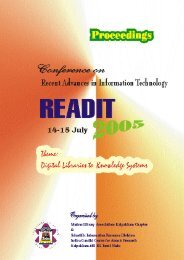READIT-2007 - Indira Gandhi Centre for Atomic Research
READIT-2007 - Indira Gandhi Centre for Atomic Research
READIT-2007 - Indira Gandhi Centre for Atomic Research
Create successful ePaper yourself
Turn your PDF publications into a flip-book with our unique Google optimized e-Paper software.
functions of the organization. Patricia Battin and Brian Hawkins made the following<br />
observation:<br />
“Librarians can no longer meet the in<strong>for</strong>mation needs of faculty and students through<br />
the traditional avenue of simply adding to their collections.” As librarian one must<br />
extend their expertise beyond collection management to knowledge management. The<br />
librarians have to extend their expertise in selecting, organizing, and preserving<br />
in<strong>for</strong>mation to new <strong>for</strong>ms of less <strong>for</strong>mal, unpublished material, we must be willing to<br />
get outside the routines and the walls of the traditional library and work more directly<br />
with technologists, faculty, and students. It means librarians will not be merely the<br />
custodians of in<strong>for</strong>mation but they will act as knowledge managers who will work<br />
with users in collecting and analyzing strategic intelligence and to act as trainers and<br />
consultants to transfer knowledge throughout the organization. In this new role the<br />
knowledge managers will be:<br />
• Knowledge management developers, working more closely with faculty and<br />
students to design, organize, and maintain a broader range of digital assets;<br />
• Knowledge management integrators, having a more active role in the<br />
educational and research mission of university, integrating in<strong>for</strong>mation<br />
resources and services in course and research projects;<br />
• Knowledge management educators; teaching and training students and faculty<br />
in<strong>for</strong>mation literacy and how to organize, preserve, and share their own<br />
in<strong>for</strong>mation resources;<br />
• Knowledge management researchers, applying library and in<strong>for</strong>mation science<br />
and new digital technology to create new organizational (metadata), retrieval,<br />
and storage (preservation) options.<br />
CONCLUSION<br />
In the present scenario of change where everyday new technologies are<br />
emerging so knowledge management is the only tool to keep oneself in the race.<br />
Knowledge management is a powerful tool <strong>for</strong> promoting innovation, realizing and<br />
reengineering the various aspects of day to day activities of an organization. The<br />
utility of knowledge management in an academic organization / library can not be<br />
ignored. The knowledge is growing very fast pace in each and every aspect of life and<br />
it is very difficult <strong>for</strong> the professionals to disseminate the available in<strong>for</strong>mation to the<br />
deserving person without using the emerging techniques. The application of<br />
knowledge management is the only solution to acquire, store and retrieve the<br />
in<strong>for</strong>mation effectively. The knowledge management helps library professionals in<br />
improving the services being rendered to their users. In<strong>for</strong>mation professionals have<br />
to recast their roles as knowledge professional. The librarian's roles should not be<br />
limited to being the custodians of in<strong>for</strong>mation but they have to acquire skills to keep<br />
themselves updated so as to cope intelligently and objectively <strong>for</strong> the effective and<br />
efficient knowledge management in an academic institute.<br />
158

















